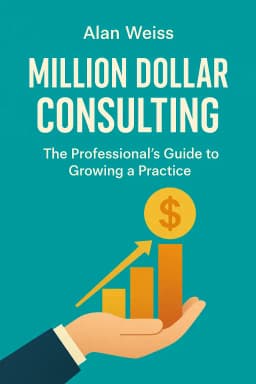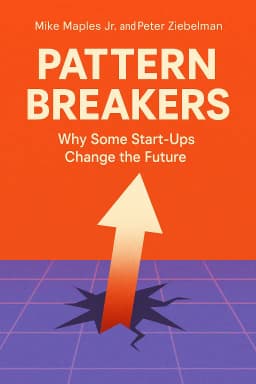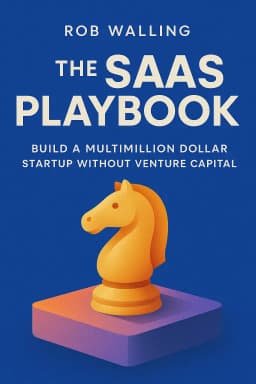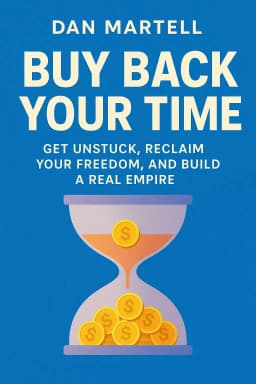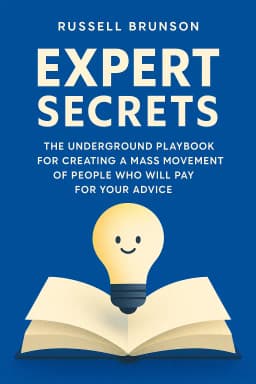
Expert Secrets: Genius or Grift?
The Underground Playbook for Creating a Mass Movement of People Who Will Pay for Your Advice
Golden Hook & Introduction
SECTION
Mark: Most people think expertise is about having all the answers. What if the secret to getting rich from your advice is actually about creating a single, powerful question in someone's mind? A question only you can answer. Michelle: Huh. That feels completely backward. I always thought being an expert meant you were the destination, the final word. You’re saying the goal is to start a mystery? Mark: Exactly. It’s about leading someone on a journey where they discover the answer for themselves, and you just happen to be holding the map. That's the provocative core of the book we're diving into today: Expert Secrets: The Underground Playbook for Creating a Mass Movement of People Who Will Pay for Your Advice by Russell Brunson. Michelle: Right, and we should say upfront, this is Russell Brunson, the founder of the massive software company ClickFunnels. That context is key, because the book has a really polarizing reputation. Some people swear it's the bible of online marketing, while others argue it's one of the most brilliant, book-length sales pitches ever written. Mark: It’s absolutely both, and that’s what makes it so fascinating to break down. He’s using the secrets on you while he’s teaching you the secrets. Michelle: A bit meta. So, where does this "underground playbook" even begin?
The Architecture of a Mass Movement
SECTION
Mark: It starts with a very grand, almost audacious idea. Brunson says don't just build a customer list; create a mass movement. And he argues that every successful movement in history, for good or for ill, is built on three pillars. Michelle: Okay, I'm already a little nervous about the phrase 'mass movement.' It has some heavy historical baggage. What are these pillars? Mark: The first is a Charismatic Leader. And before you cringe, he argues this isn't about being born with some magnetic stage presence. It's about becoming an 'attractive character' that people can relate to. You do that by sharing your journey, your flaws, and the results you've achieved. You just have to be one chapter ahead of the people you're leading. Michelle: One chapter ahead. I like that. It feels more achievable. It’s not about being a guru on a mountaintop; it's about being a guide who's a little further down the path. Mark: Precisely. He tells the story of Jacob Hiller, a guy who was just obsessed with learning how to dunk a basketball. He wasn't a pro athlete or a scientist. He just documented his own experiments on YouTube, trying everything to increase his vertical jump. Over time, he built this huge following of people who wanted the same thing, and he became their leader, eventually building a multi-million dollar company teaching his methods. He was just a guy with a desire and a camera. Michelle: So the leadership comes from the journey, not from some innate authority. Okay, that feels less cult-like. What's pillar number two? Mark: The second is a Future-Based Cause. He says people don't follow a leader just for who they are; they follow them to get somewhere. The cause has to be about a better future. It’s about giving people hope. He uses the tagline from Star Wars: "Rebellions are built on hope." Your movement has to be the rebellion against their current reality. Michelle: And pillar three? This feels like the most important one. Mark: It is. He calls it The New Opportunity. This is the absolute linchpin of his entire philosophy. He argues that you should never, ever sell an 'improvement.' People don't want to improve their current life; they want a new one. Improvement implies their current method is okay but could be better. It also means they have to admit that they failed in the past. A new opportunity offers a clean slate. Michelle: Wait, so if I’m a fitness coach, I don't sell 'a better way to lose weight'? Mark: No. According to Brunson, that's a losing game. You're competing with every other diet and workout plan. Instead, you create a new vehicle. You don't sell 'improved dieting'; you sell 'The Ketosis Revolution' or 'Metabolic Re-engineering.' It's a completely new path that makes the old path irrelevant. The old way failed them; it wasn't their fault. This new way is the real secret. Michelle: I can see how that’s incredibly powerful from a marketing perspective. It absolves the customer of past failure and gives them a shiny new thing to believe in. But it also feels like it could just be clever rebranding. Is there a real difference between 'a better workout' and a 'Kinetic Chain Realignment System,' or is it just semantics? Mark: That is the million-dollar question, and Brunson’s answer is that the difference is created in the mind of the customer. And the tool he uses to create it is the most important secret in the entire book.
The Engine of Belief: Storytelling as the Ultimate Persuasion Tool
SECTION
Michelle: Okay, so how do you make people believe that your rebranded workout plan is actually a revolutionary new opportunity? Mark: You don't tell them it is. You lead them to that conclusion themselves through a story. He calls this the Epiphany Bridge. The goal is to give your audience the same 'aha!' moment you had, so they feel like they discovered the secret on their own. People will fight to the death to defend a conclusion they believe they came to themselves. Michelle: An Epiphany Bridge. It sounds so... magical. But I'm guessing there's a very specific formula behind it. Mark: Oh, there's a very detailed formula. It's built on the classic Hero's Journey structure. The story needs a character with a desire, who faces a conflict, hits a wall, has an epiphany, and is ultimately transformed. He uses his own origin story as the perfect example. Michelle: I'm curious to hear this. The famous 'Potato Gun Expert' story, right? Mark: The very same. So, the backstory is he's a newly married, broke college wrestler. His desire is simple: make enough money online so his wife can quit her job and he can keep wrestling. He starts selling a DVD on how to build potato guns. It's a tiny, niche business, but it's making him a few bucks a day. That's his external journey. Michelle: A relatable struggle. What's the conflict? Mark: The conflict, the wall he hits, is that Google suddenly changes its advertising algorithm overnight. His ad costs triple, and his tiny business is wiped out. He's devastated. He feels like a failure. This is the moment of despair that every good story needs. Michelle: And then comes the epiphany. Mark: Exactly. A friend tells him about the concept of 'upsells'—offering a customer something else right after they buy. So he partners with a guy who sells potato gun kits. Now, when someone buys his $20 DVD, he immediately offers them a $197 full kit as an upsell. And it works. Suddenly, he's making more money from the upsell than the original product. The epiphany isn't 'I should sell potato guns.' The epiphany is: 'Oh my gosh, the secret to online business isn't the product, it's the funnel—the process you lead a customer through.' Michelle: And that single epiphany, that one idea, becomes the foundation for his entire empire with ClickFunnels. Mark: It's the Big Domino. If he can make you believe that funnels are the only key to online success, then every other objection you have—about what to sell, how to build a website, how to advertise—it all becomes irrelevant. You just need a funnel. And he, of course, has the best tool to build one. Michelle: I have to admit, that's a compelling story. It has stakes, emotion, and a clear 'aha' moment. But hearing you break it down, it also feels incredibly... engineered. He's open about the fact that he has a script for this, for identifying your origin story and your 'Epiphany Bridge.' Is this authentic connection, or is it a system for manufacturing epiphanies in other people? Mark: I think that's the central tension of the book. He would argue that he's just codifying what great storytellers and leaders have always done intuitively. He's giving people who aren't natural storytellers a framework to share their message effectively. Michelle: But it also feels like it could be used to create a belief that isn't necessarily true, just to sell something. It's a fine line between empowering someone with a new perspective and manipulating them with a well-told story. Mark: A very fine line. And that line gets even blurrier when we get to the final part of the process: how you actually ask for the money.
The Conversion Machine: The 'Perfect Webinar' and the Ethics of the Stack
SECTION
Michelle: Right. So you've built your mass movement, you've used your Epiphany Bridge story to make them believe in your new opportunity. How do you transition from inspirational leader to salesperson without breaking the spell? Mark: You do it with what he calls the 'Perfect Webinar' script, and the most critical piece of that script is a technique called the 'Stack Slide.' He actually learned this from another marketer, Armand Morin. The idea is that people's brains can't really hold onto a long list of items. They just remember the last thing you said. Michelle: Okay, so how does that apply to selling something? Mark: Well, the old way was to say, "You get my course, PLUS you get this bonus, PLUS this other bonus, and it's all for $997." The customer's brain just hears "this other bonus for $997" and anchors the price to that last item. The Stack changes that. You introduce the main course and assign it a value, say $2,000. You put it on a slide. Then you introduce the first bonus, say, a set of tools valued at $1,000. You add it to the slide on top of the course. Now the slide shows a total value of $3,000. Michelle: Oh, I see where this is going. You keep stacking. Mark: You keep stacking. You add another bonus, another tool, another private group. With each item, the visual on the screen grows, and the total value climbs—$5,000, $8,000, maybe $10,000. You spend 10-15 minutes building this mountain of value. Only after you've anchored their perception of the value at $10,000 do you reveal the actual price: "But you're not going to pay $10,000 today... you can get everything for just $997." Michelle: That is brilliant and also a little terrifying. The perceived value is so enormous that the price seems almost trivial in comparison. It creates this massive fear of missing out. It feels almost illogical not to buy it. Mark: It's designed to be a logic-breaker. It bypasses the rational brain and hits the emotional trigger of getting an incredible deal. And it works. He says his own sales conversions quadrupled when he started using the Stack. Michelle: And this is where the criticism that the whole book is just a sales funnel for his own products really lands for me. He's not just teaching you a method; he's selling you on his method, using the very psychological triggers he's describing. The book itself is an Epiphany Bridge leading you to believe that funnels are the 'New Opportunity,' and his software is the only vehicle. Mark: Absolutely. The book is the top of his funnel. It's a masterclass in practicing what you preach. He is the charismatic leader, his cause is freeing entrepreneurs from traditional business models, and his new opportunity is the sales funnel. Michelle: So, when you buy the book, you're not just a reader; you're a case study in progress. Mark: You're already in the funnel.
Synthesis & Takeaways
SECTION
Michelle: So, stepping back from all these secrets and funnels, what's the big picture here? What is this book really about? Mark: I think what we're really looking at is a blueprint for influence in the digital age. It's powerful because it merges classic, almost timeless principles of persuasion and human psychology with the scalable technology of the internet. But its power is also precisely what makes it so controversial. Michelle: For me, the biggest takeaway is the importance of awareness. Whether you're a consumer scrolling through Instagram or an entrepreneur trying to sell your product, you need to understand these psychological triggers. The book lays them bare. Mark: That's a great point. The tools themselves—storytelling, building value, creating a community—are neutral. You can use them to build a genuine movement that truly helps people, or you can use them to create a high-pressure, manipulative sales environment. Michelle: The ethics are all in the application. It depends on whether your 'New Opportunity' is a genuine breakthrough or just a fancy new label for the same old thing. It depends on whether your 'Epiphany Bridge' leads to a real insight or just a credit card form. Mark: So the question for our listeners, especially those who have a skill or a passion they want to share, is this: How do you take these incredibly powerful tools and use them ethically and effectively? This book gives you a loaded weapon; how you aim it is up to you. Michelle: I think that's a perfect place to leave it. And we'd love to hear from our listeners on this. Where do you draw the line between powerful persuasion and outright manipulation? Let us know your thoughts. Mark: This is Aibrary, signing off.

